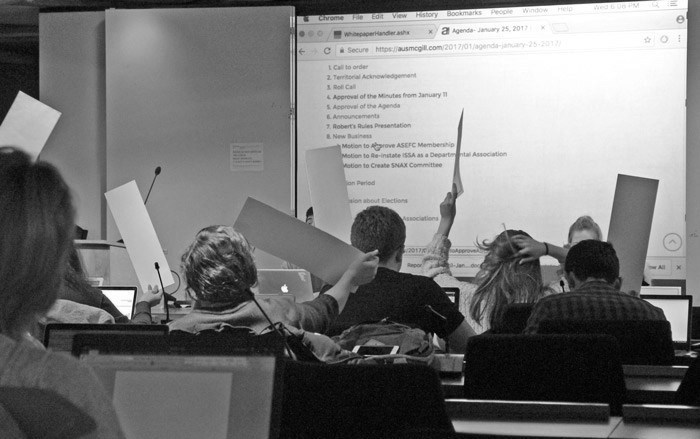During the Arts Undergraduate Society (AUS) Legislative Council on Feb. 27, representatives unanimously approved two questions for the upcoming AUS referendum concerning the powers of the Executive Committee. One asked whether executives should be restricted from voting on AUS matters digitally and the other whether executives should be allowed to consider matters that the Legislative Council has already voted on. The AUS referendum will take place Mar. 18-21.
Both motions were prompted by the controversial approval of the POLI 339 course fee, which was originally rejected by Legislative Council on Jan. 30 before subsequently being approved by the Executive Committee in a private vote over Facebook. The AUS Secretary-General team had previously suspended the Executive Committee’s decision following allegations that the vote was unconstitutional and, during the meeting, presented the findings of their investigation into the matter.
The report, conducted by AUS Secretary-General Sophie Zhao and Deputy Secretary-General Nathan Mendel, found that all seven members of the Executive Committee had broken the AUS constitution and could therefore be removed from office. The report specifically condemned the actions of AUS President Maria Thomas as well as Arts Representatives Andrew Figueiredo and Ana Paula Sánchez.
“President Thomas did not execute her duty to ensure the Executive Committee’s compliance with the Constitution and By-Laws,” the report reads. “She knowingly allowed the Executive Committee to violate […] the AUS Constitution [….] The actions of Arts Representative Figueiredo and Sánchez contradict their agreement and duties as outlined in […] the Arts Representatives contracts.”
After the Secretary-General team’s presentation, Thomas apologized for her actions and confided that she was considering resigning.
“To be very honest, this meeting has given me a lot to think about,” Thomas said. “I kind of feel like I’ve failed all of you. I will think about it, and, if need be, I will resign, given that I was in charge of the Executive Committee.”
Council members were concerned with Sánchez’s actions and departmental representatives asked for her to apologize in front of the council. Sánchez is the only executive that hasn’t signed on to the public apology.
“I think a lot of the council members are curious about why she’s the only one who hasn’t addressed this issue,” Lily Yu, vice-president external affairs of the African Studies Students’ Association said. “A lot of people were hurt through this process, and she […] has yet to acknowledge it. I’m not trying to attack her, I’m just genuinely curious why.”
Sánchez addressed the council, stating that she had posted an apology on Facebook and had also expressed condolences in an opinion article published by The McGill Tribune.
“I’m very grateful to have had a [meeting] where departmental executives and constituents could express their thoughts and feelings,” Sánchez said. “I tried answering all concerns to the best of my abilities and [am] reiterating my apologies for deficient constitutionality.”
Following the Secretary-General team’s suspension of the POLI 339 vote, Figueiredo resigned from his position on Feb. 20. Representatives from departmental associations also created a petition on Feb. 15 calling for the resignation of the two other Arts Representatives, Sánchez and Garima Karia. 12 of 27 departmental associations have signed the petition, which also calls on the AUS Legislative Council to consider writing future motions that would address the damage of the Executive Committee’s actions.
Errata: A previous version of this article incorrectly misquoted that it was HSA Vice-President External Maeve Botham who was curious about AUS Arts Representatives Ana Paula Sánchez not acknowledging the issue. In fact, it was ASSA Vice-President External Affairs Lily Yu. The Tribune regrets this error.








She should absolutely resign, as should the whole council.